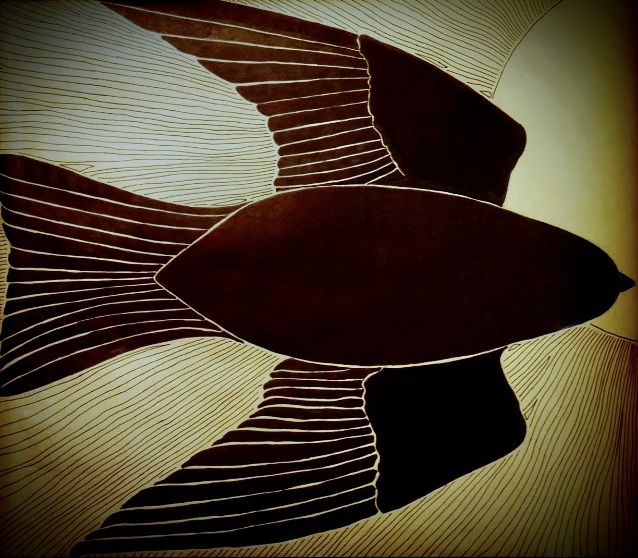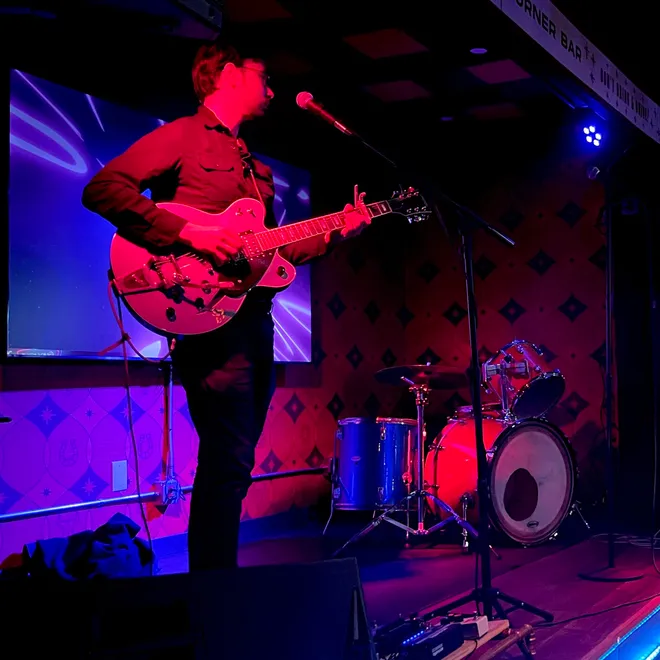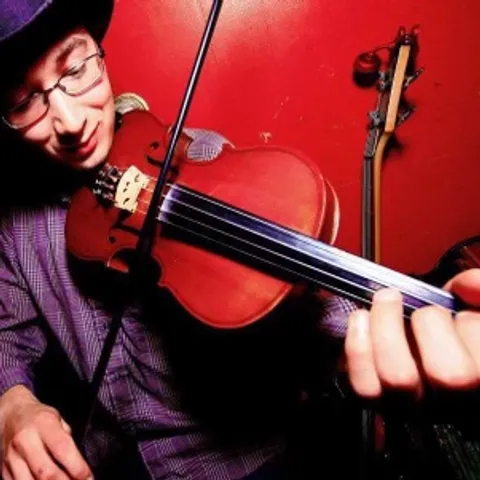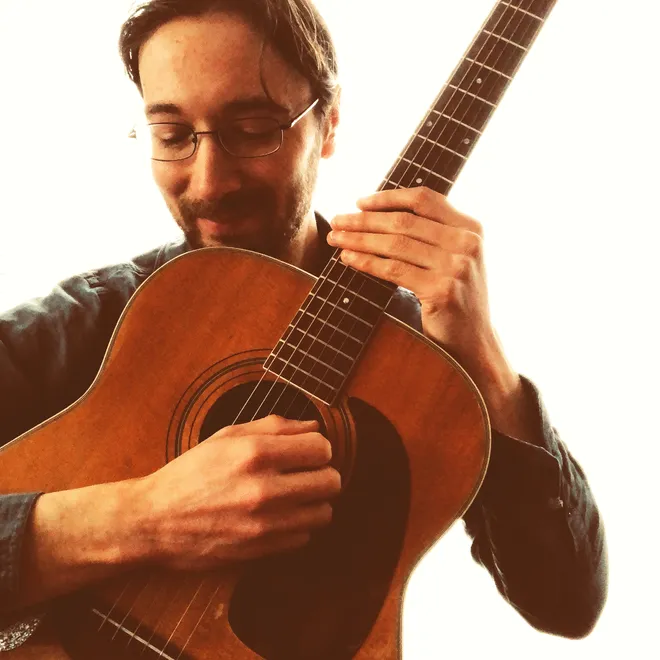We were lucky to catch up with Anthony Papaleo recently and have shared our conversation below.
Alright, Anthony thanks for taking the time to share your stories and insights with us today. How did you learn to do what you do? Knowing what you know now, what could you have done to speed up your learning process? What skills do you think were most essential? What obstacles stood in the way of learning more?
My parents bought me my first guitar when I was six, so I’ve been playing music for most of my life. My Dad played guitar and I credit him as my first inspiration. He taught me a lot and really gave me a strong foundation and truly a running start.
Since then, my whole life has basically been molded around music. It’s sort of been the sun in my solar system that has been sustaining life on my little orbiting rock. Pretty much all of my friends growing up were made through a mutual interest in music and art and it’s really no different, 30 years later.
I’ve been incredibly fortunate to have so many friends and worked with so many amazing people and artists. I’ve immersed myself in so many different communities throughout the years.
That’s really how I learned and am still learning. By being around people that are making art and from them introducing me to recordings and other mediums that I may have never found otherwise. I’ve tried to absorb as much as I can from them.
I can remember being in high school and my friend, Jay showing me stuff like Son House or Tom Waits and teaching me how to do a finger picking pattern on guitar. Stuff like that blew my mind. It’s really organic experiences and relationships like those that have kept me inspired and eager to keep learning.
I didn’t even realize that I could make a living playing music until I was in my twenties. I moved to Akron and immediately started playing with bands around town. Since then, I’ve moved around, worked with countless artists in the area and landed in Lakewood about 7 years ago.
Jumping into the gigging scene teaches you lessons that you can’t learn from sitting in your room and practicing 8 hours a day. When you’re on stage in front of an audience or in a recording booth it kind of forces you to let go of any sort of academia, theory or just simply thinking too much and just try to emote. Music is only partially the physical ability to play an instrument. It’s mostly learning how to emote. I think that’s what gigging and songwriting has taught me the most.
I’ve been a professional musician for around 15 years now and it’s always evolving and my interests are always changing. Whether I’m working on a new song of my own or working with someone else to try and support their vision, or just playing music with friends in a living room, I feel fortunate to be a part of a community that inspires me to grow and to continue to have a practice everyday.

As always, we appreciate you sharing your insights and we’ve got a few more questions for you, but before we get to all of that can you take a minute to introduce yourself and give our readers some of your back background and context?
I have been making music and art for most of my life. I moved from the small city of Chardon to Akron in 2012 and started playing professionally, branded as a freelance multi instrumentalist. That really opened a lot of doors for me to meet and work with a lot of different artists, regionally and internationally. I moved to Lakewood in 2018 and started experiencing the Cleveland music scene.
I’ve spent a lot my career honing my craft and saying yes to every gig that came along. I like to think that all of that experience can’t help but show in my own work. Over the past few years I’ve made a conscious decision to focus on just that. My own work.
In January 2025, I put out my first single, “Bird’s Eye View”. It’s accompanied with a video that I also illustrated and filmed. My goal is to keep progressing as a solo artist and continue to integrate my music and songwriting with my love of visual art.
Although my main focus is my own creatives at the moment, I have the pleasure of working with several projects.
Every last Monday of the month I play at the Winchester with Ray Flanagan and a different special guest. We started about a year and a half ago and have been consistently seeing an immense amount of support at these shows. It’s also been some of the firsts that I’ve been able to present my own songs to an audience. It’s become one of our favorite gigs and has sort of organically turned into a “review” of the talent that Cleveland has to offer.
I also often work with the Cleveland Tango School run by Micaela Barrett and Alberto Ramos Cordero. They are primarily a dance school and host events every first and third Wednesdays at Riffs and Forest City Brewery. I’ve worked with them to begin integrating local musicians to play in between dances. They also organize a community orchestra jam that focuses on playing traditional tango music every second Wednesday at the Treelawn in Waterloo.
If the juxtaposition wasn’t clear enough, I also regularly play in a country band, aptly named, Country Honk with Thor Platter, Tom Prebish and Fred Pérez Stable. We perform every second Sunday at Forest City Brewery. We just released a full length album and are heading to Nashville, TN for Americana Fest in September.
Among these projects, I continue to work with a long list of people in the community: Bethany Joy, Nolan Cavano, Cory Grinder and the Playboy Scouts, Ben Gage, Pete Lazard and so many others that continue to create and allow the Cleveland music scene to thrive.

How can we best help foster a strong, supportive environment for artists and creatives?
Life as a full time musician isn’t always glamorous and certainly comes with it’s own unique set of challenges.
Like most fields, it takes a lot of resilience and dedication to continue doing it as a full time job and relies on consumers to make it sustainable.
That being said, it can make the whole ordeal very confusing. Ideally, you hope that the relationship between the artist and audience feels reciprocal. Meaning, that the artist is able to create what feels true and meaningful to them and the audience responds enthusiastically.
It’s not always the case, of course. Especially in current day when all of our entertainment is conveniently available at our fingertips. It makes for a system that devalues art and perpetuates a need to curate for an audience, rather than presenting honest and thoughtful work.
In a way though, I see it as a positive in that, it makes certain people rebel against the comfortability of constant consumption on a smart phone. It seems that the more that takes precedent in our lives, the more relevant it is to people to go out and enjoy something like live music.
And that’s really the best thing people can do in my opinion. Go out and support live music, buy recordings, share their work with your friends. I realize that it’s difficult, especially financially, but to me growing community and supporting artists will result in a much more sustainable society for everyone.

What do you find most rewarding about being a creative?
I sometimes feel selfish as an artist. It requires a lot of time, patience and effort for something that I sometimes question whether it is actually making a difference.
When I’m confronted with that thought, I try to imagine my life without my favorite musicians and songs and I really can’t fathom it. Music has given me such hope in the darkest times in my life and I think it does the same for a lot of people.
People often come up to me after a show and just seem excited to have had that experience of sitting and listening or dancing to music. They want to talk about it and thank you for giving them some sort of relief. Expression is a very primal behavior in animals and I don’t think it’s any different or any less important today. Not every gig is like that and sometimes I feel like I might as well be wallpaper or a piece of furniture in the room, but it’s the ones where people do appreciate what you’re doing that make me feel like I’m doing something worthwhile.
I also hold so much reverence and respect for my peers and musicians that came before. I’ve just always wanted to be a part of that club. A lot of the way in which I’ve learned music has been in the traditional folk music sense of it being passed down from generation to generation. I don’t know that I feel obligated, but more so, I feel honored and lucky to do the same.
It’s really the best way I know how to connect with other humans.
Contact Info:
- Website: https://www.anthonypapaleo.com
- Instagram: a_p_leo
- Facebook: https://www.facebook.com/share/1CEVru4V38/?mibextid=LQQJ4d
- Youtube: https://youtube.com/@anthony_papaleo?si=-laQ8DbedLb6RnWm
- Other: Bandcamp: anthonypapaleo.bandcamp.com





